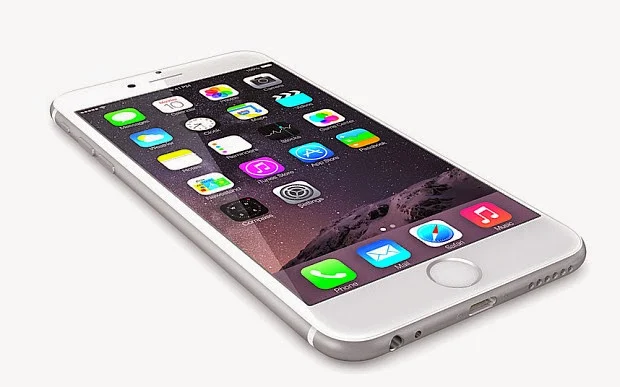New images displaying parts for the new full sized iPad have been leaked much ahead of its forthcoming Apple event, wherein photos re-published by apple.club.tw blog portrays a full logic board for the new iPad Air together with parts for the new Home button with Touch ID, glass screen cover and audio control components.
The new iPad Air logic board, at first glance does not show anything new though adjusting colours of image indicate an unexpected addition, an A8X system on a chip. The new Apple iPad Air 2 shortly to be announced is rumoured that the slate is powered by an A8X chip. The A8X variant of Apples’ chip like the earlier A5X and A6X, will probably have improved GPU performance which is also an indication that Apple would be putting the display resolution to the forthcoming iPad Air 2 to the Retina HD.
This has been discovered in the updated iOS 8.1 Beta which showed user interface elements designated as `3x-ipad’. The A8 chip seems to be a powerful processor which can handle larger iPhone screen and hence it seems that the A8X would be bringing the iPad much ahead of the iPhone with regards to specifications for the first time in a few years, if legitimate.
RAM increased to 2GB – Heavy Multitasking
Though the specifics of the resolution in question are unknown, there is a possibility of Apple shipping a sharper display than the present 2048 x 1536 pixel panel. Besides, additional GPU horsepower is not the only thing the A8X would be bringing to the table, it is alleged that the RAM would also be increased to 2GB, enabling heavy multitasking.
Other novelties for iPad user would be thinner profile at 7.5mm, 720m FaceTime camera together with Apple Pay besides the Touch ID. The internal storage option is also said to be of 32GBm 64GB and 128GB.There could also be various other reasons for Apple to choose to move to the A8X on its latest iPad Air, in making the iPad far better at graphics processing than the iPhone.
Some analyst reports together with indications from the iOS 8.1 beta software development kit shows that Apple would be moving to higher resolution Retina HD displays on the iPad Air later this year, shows that the screen would be 30-40% sharper on the iPad Air.
Need of a Much Stronger Graphic Processor
With the addition of pixels across 9.7 inches screen space, the iPad Air would need a much stronger graphics processor in order to keep the device functioning smoothly during operation. The new volume control component was also leaked wherein the audio volume up and down buttons are seen on the lower end of the image displayed, but in line with some leaked shells, a dedicated mute switch though is not shown on this particular part.
At the moment, there is a lack of leaks with regards to the new iPad mini which could be due to the constraints of shipping of the new model through 2014.The event on October 16th,will also be covering sharper iMacs and MacBook together with final details on OS X Yosemite.
The new iPad Air logic board, at first glance does not show anything new though adjusting colours of image indicate an unexpected addition, an A8X system on a chip. The new Apple iPad Air 2 shortly to be announced is rumoured that the slate is powered by an A8X chip. The A8X variant of Apples’ chip like the earlier A5X and A6X, will probably have improved GPU performance which is also an indication that Apple would be putting the display resolution to the forthcoming iPad Air 2 to the Retina HD.
This has been discovered in the updated iOS 8.1 Beta which showed user interface elements designated as `3x-ipad’. The A8 chip seems to be a powerful processor which can handle larger iPhone screen and hence it seems that the A8X would be bringing the iPad much ahead of the iPhone with regards to specifications for the first time in a few years, if legitimate.
RAM increased to 2GB – Heavy Multitasking
Though the specifics of the resolution in question are unknown, there is a possibility of Apple shipping a sharper display than the present 2048 x 1536 pixel panel. Besides, additional GPU horsepower is not the only thing the A8X would be bringing to the table, it is alleged that the RAM would also be increased to 2GB, enabling heavy multitasking.
Other novelties for iPad user would be thinner profile at 7.5mm, 720m FaceTime camera together with Apple Pay besides the Touch ID. The internal storage option is also said to be of 32GBm 64GB and 128GB.There could also be various other reasons for Apple to choose to move to the A8X on its latest iPad Air, in making the iPad far better at graphics processing than the iPhone.
Some analyst reports together with indications from the iOS 8.1 beta software development kit shows that Apple would be moving to higher resolution Retina HD displays on the iPad Air later this year, shows that the screen would be 30-40% sharper on the iPad Air.
Need of a Much Stronger Graphic Processor
With the addition of pixels across 9.7 inches screen space, the iPad Air would need a much stronger graphics processor in order to keep the device functioning smoothly during operation. The new volume control component was also leaked wherein the audio volume up and down buttons are seen on the lower end of the image displayed, but in line with some leaked shells, a dedicated mute switch though is not shown on this particular part.
At the moment, there is a lack of leaks with regards to the new iPad mini which could be due to the constraints of shipping of the new model through 2014.The event on October 16th,will also be covering sharper iMacs and MacBook together with final details on OS X Yosemite.





